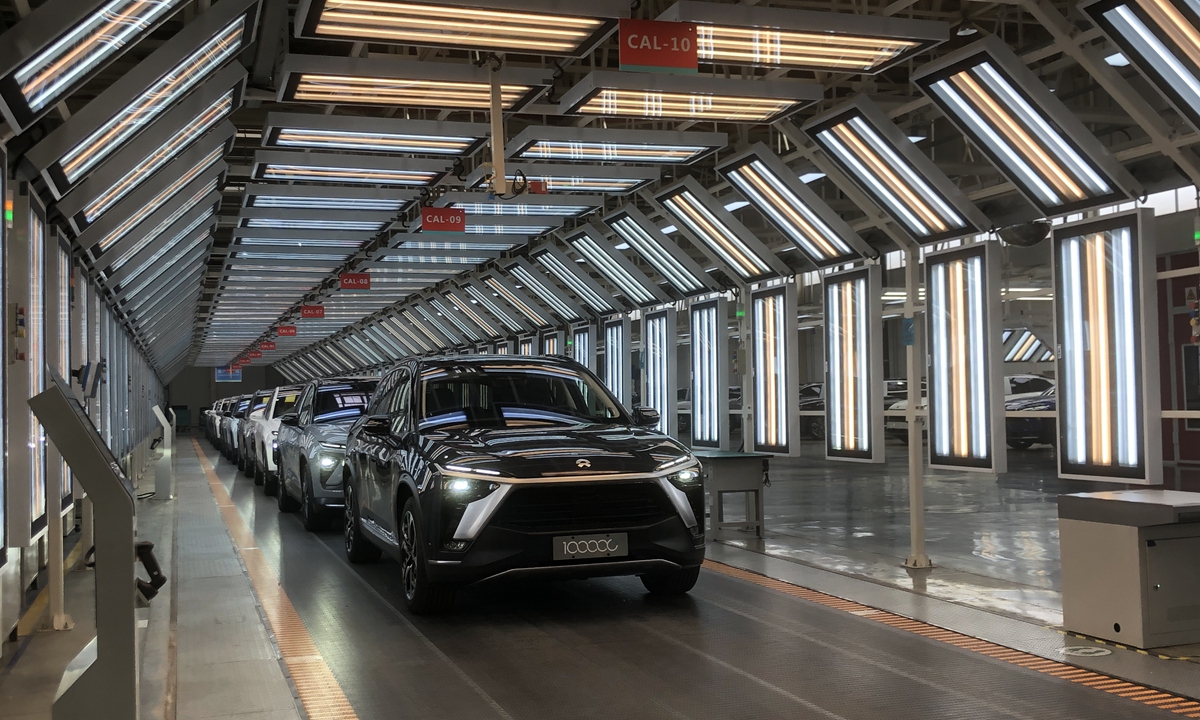
Nio's 100,000th production vehicle ES8 rolls off the assembly line on Wednesday in Hefei, capital of East China's Anhui Province. Photo: Zhang Hongpei/GT
Electric vehicle maker Nio saw its 100,000th car roll off the assembly line on Wednesday, a milestone for the Chinese electric vehicle (EV) start-up since its first vehicle was manufactured nearly three years ago.
Nio's mass production picked up quicky since the mid-2020 when its 50,000th vehicle rolled off the assembly line in the facility it partners with Chinese state-owned automaker JAC. All Nio's cars are manufactured in the JAC-Nio production base in Hefei, capital of East China's Anhui Province.
William Li Bin, chief executive officer of Nio, said at a press conference prior to the rolling-off event on Wednesday that compared with conventional carmakers that rely on internal combustion engines, the production of 100,000 units is still a small quantity, and the EV industry is still at the early growth phase.
Having climbed to such mass production level for a Chinese EV maker in about three years, it signified that Nio has made a steady and firm footprint in China, the world's largest new-energy vehicle (NEV) market, and its products - high-profile cars priced over 420,000 yuan ($64,000) per unit on average - have been widely recognized by the market, Cui Dongshu, secretary general of the China Passenger Car Association, told the Global Times on Wednesday.
It has laid a solid foundation for domestic EV brands to expand their business, Cui noted, adding that tech innovation is the key driver of sustainable growth for the start-ups.
Nio began deliveries of the ES8, a 7-seater high-performance premium electric sport utility vehicle (SUV) in China from June 2018 and officially launched the ES6, a 5-seater high-performance premium SUV, in December 2018. It later launched the EC6 - a 5-seater premium electric coupe SUV, in December 2019.
The Hefei facility now has production capacity of about 400 units per day, Li said, however, Nio is feeling the same pinch as other global automakers has over recent months due to the supply chain disruptions arising from a chip shortfall.
Last week, Nio said it would halt production for five days starting March 29, citing chip shortages.
Most of the automotive chips that have experienced supply shortage are basic auto chips , which will pose short-term pressure on the firm. Li forecast that that the challenge will become larger in the second quarter which will be eased in the third quarter.
Nio's deliveries in the January-March quarter reached 20,060 units, for the first time topping 20,000 units on a quarterly basis, up 423 percent compared with the same period last year.
Nio, along with Xpeng, Li Auto, Geely and BYD, have been dubbed the Chinese challengers to Tesla as they build smart EVs that use innovative technologies such as autonomous driving and intelligent connection with mobile devices. Sale prices of Tesla vehicles are about 150,000 yuan lower on average compared with Nio's.
Li reiterated the rivalry relations with industry bellwether Tesla, saying the latter is also "teammate" belonging to the EV family, challenging the dominant position long held by traditional luxury automakers such as by Benz, BMW, Audi and Toyota.
Betting on a positive outlook for Chinese EV sector buoyed by robust consumer demand, more Chinese firms ranging from internet firms to smartphone vendors have announced their plan to make foray into the EV sector, which is set to intensify competition.
Chinese online car-hailing platform Didi Chuxing has started its own EV manufacturing business, according to a report by domestic media outlet LatePost on Tuesday.
Lei Jun, founder and CEO of Xiaomi, stated on March 30 that its smart EV business will be operated under a wholly-owned subsidiary by Xiaomi with an initial investment of 10 billion yuan.
Baidu said earlier in 2021 that it formed a strategic partnership with automaker Geely to create a standalone EV unit.
With more players jumping onto the EV bandwagon, Li said it is a good thing to push EV development, and accelerate the pace of shift from fuel-powered autos to clean and green mobility.
Eyeing for the overseas markets, Nio has the ambition and "is willing to shoulder the responsivity" to go overseas, and the firm plans to enter the European market in the second half of this year and other international markets in 2022, according to Li.
"We had a plan to enter the US market in 2017. It is not the slow pace that matters but the pressure ahead especially amid the current international background," Li said, noting that Nio has no expectation that it will gain the same smooth development in the EU or US markets as Tesla's smooth advance in the Chinese market.




